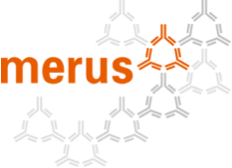Tag: Ton Logtenberg
Company News: Merus starts Phase I/II clinical trial for MCLA-128, an ADCC-enhanced bispecific antibody for solid tumors
![]()
– First patient dosed in trial with potent bispecific antibody overcoming resistance to HER2-targeted therapies –
Merus B.V., a leader in developing best-in-class bispecific antibody therapeutics to treat cancer patients, today announced the initiation of a phase I/II clinical study of MCLA-128 for the treatment of solid tumors. MCLA-128 is an ADCC-enhanced, full-length IgG bispecific antibody that simultaneously targets the growth factor receptors HER2 and HER3.
The trial is an open-label, European multi-center dose escalation study to assess the safety, tolerability and anti-tumor activity of MCLA-128. The first part of the study is designed as a dose escalation study, followed by a second part to further characterize the safety, tolerability and clinical efficacy of MCLA-128. Initially, the study will enroll 52 patients with advanced epithelial tumors. Primary endpoint is safety; secondary endpoints include, among others, the immunogenicity of MCLA-128 as well as anti-tumor response and clinical benefit.

